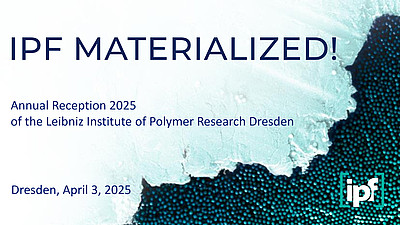News
Annual Reception of the Leibniz Institute of Polymer Research Dresden

On April 3, 2025, more than 240 distinguished guests, friends, and members of the Leibniz Institute of Polymer Research Dresden (abbrev. IPF in German) gathered at the Deutsches Hygiene-Museum Dresden for the institute's annual reception and the launch of the Saxon bioelectronics research network BiotroNiS.
In her welcome address, Professor Heike Graßmann, Secretary of State at the Saxon State Ministry of Science, Culture and Tourism, highlighted the IPF’s new research program, which aims to realign the institute's profile and leverage the complementary expertise of its researchers. A key focus of the program is to translate advanced materials research into real-world applications, ensuring the IPF remains at the forefront of scientific and technological progress. Overall, Professor Graßmann expressed confidence that the institute’s dynamic evolution will continue to yield pioneering solutions for future technologies.
The evening’s keynote lecture was delivered by Professor Peter Fratzl of the Max Planck Institute of Colloids and Interfaces. In his talk “From Optimality to Adaptivity: A Bio-Inspired Vision of Sustainable Materials”, Professor Fratzl explored the transition from responsive to dynamic, adaptive materials. He also addressed the convergence of chemistry and synthetic biology in creating engineered living materials, and emphasized the need to integrate cultural and sociopolitical dimensions into materials development. His memorable statement “Survival means adaptation, not optimization” resonated with the audience, underscoring the transformative nature of modern material design.
Another highlight of the evening was the BiotroNiS launch lecture, introduced by Professor Karl Leo from the TU Dresden. The BiotroNiS network, coordinated by the IPF, integrates research efforts across Saxony to develop bioelectronic materials and systems that bridge electronic circuits and living organisms. The launch lecture was presented by Professor Sahika Inal, Associate Professor of Bioengineering at King Abdullah University of Science and Technology. In her presentation “Next Generation Bioelectronics Enabled by Materials Discovery”, Professor Inal discussed how organic mixed conductors are revolutionizing bioelectronics by mimicking biological systems, incorporating novel sensing modalities, and enabling therapeutic applications through coupling with living matter.
The evening also featured a concert by the Kurt Masur Academy of the Dresden Philharmonic Orchestra, enchanting the audience with compositions by Saint-Saëns, Widor, and Beethoven. The subsequent award ceremony of the IPF’s Association of Supporters was moderated by the association's chair, Dr. Rui de Oliveira. This year’s awardees included Dr. Elisha Krieg and his team, who received the Innovation Award, Dr. Patricia Flemming, honored with the Doctoral Thesis Award, and My Duyen Pham, who was presented with the Professor Franz Brandstetter Prize for her master's thesis.
The IPF’s annual reception once again proved to be a vibrant platform for promoting the exchange of ideas and celebrating exceptional achievements in the field of polymer materials science.
14.04.2025

